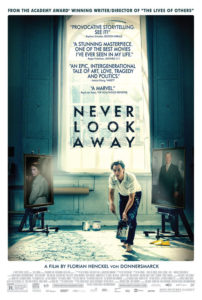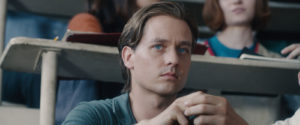Film Review: In the End, “Never Look Away” Looks Not Closely Enough
Written by: Christopher Llewellyn Reed | November 30th, 2018

Never Look Away (“Werk ohne Autor”) (Florian Henckel von Donnersmarck, 2018) 2 out of 4 stars.
Never Look Away – or “Werk ohne Autor” (“work without an author”) in the original German – begins in a Dresden museum in 1937, where a boy, Kurt, and his aunt, Elizabeth, take a tour of an exhibit of modern art from the past 20 years, now labeled as “degenerate” by the ruling Nazi party. She – a young woman barely past childhood, herself – confesses to her nephew that she actually likes what they see. Perhaps she’s a quiet rebel, as otherwise the visit goes off without a hitch. Upon their return home, however, Elizabeth asks the local bus drivers, gathered in the depot, to blow their horns in a symphony of noise, reveling in the overwhelming sound. Sensitive and unstable, Elizabeth will soon face the same fate as did all those who stood out from the mainstream at that time.
A sweeping historical saga that takes us through to 1960s West Germany, the film, from director Florian Henckel von Donnersmarck (The Lives of Others), starts off well, bogs down in the middle, then picks up steam again in its final third, only to falter at the end, never quite realizing its earlier promise. Given how beautifully filmed so much of it is, however, the full disappointment of the conclusion takes a while to register, its ultimate shallowness masked by the moving performance of lead actor Tom Schilling (A Coffee in Berlin) and von Donnersmarck’s considerable skill with mise-en-scène. Perhaps if it were not over three hours long, the sting of the movie’s ultimate narrative failure would hurt less.

As Kurt grows older, his aunt’s final words to him – “Never look away; everything that’s true is beautiful” – continue to haunt him, leading him first past the destruction of his hometown, then to art school and finally to the West. Post-World War II, Dresden found itself on the other side of the Iron Curtain, with a new kind of disdain for innovative, expressionist painting: what was before degenerate is degenerate once more, the strictures ofsocialist realismbrooking no more dissent than did those of the Nazis. Kurt navigates this newly suffocating world of propaganda as best he can, until, on the eve of the construction of the Berlin Wall, he flees communism for better opportunities.
By this time, he is long-since married. In a bit of unfortunate cinematic coincidence (the worst kind), the love of his life just happens to be the daughter of the doctor who sent his aunt away to a death camp. This man – Professor Carl Seeband, played by Sebastian Koch (Bel Canto) – has managed to avoid prosecution for his crimes by making an alliance with his new Soviet masters, but this has not stopped him from remaining an unrepentant tyrant to his wife and daughter. This latter, Ellie (a short form of Elizabeth, in another coincidence) – played by a very fine Paula Beer (Frantz), who deserves better than this underwritten part requiring a fair amount of nudity – cannot quite shake her father’s influence, and even after first he and then they head west, Professor Seeband remains a domineering albatross around her and Kurt’s necks.
Eventually, Kurt finds his way among the West German art world, building a body of work based on his experiences back in Dresden and thereafter. This is where the movie again becomes interesting after its slow middle section. Sadly, though, Kurt’s big inspiration is framed as a sudden bolt from the blue, without direct connection to the trauma of his youth, despite the juxtapositions he creates of his aunt and father-in-law. Whatever long-simmering (emphasis on long) catharsis we have been expecting is lessened by the seeming chance of the compositions. “Everything that’s true is beautiful” means very little if the artist remains unaware of the authenticity of his work. That’s just happenstance, which makes for disappointing drama, after all that he (and we) have been through.
In German with English subtitles.

